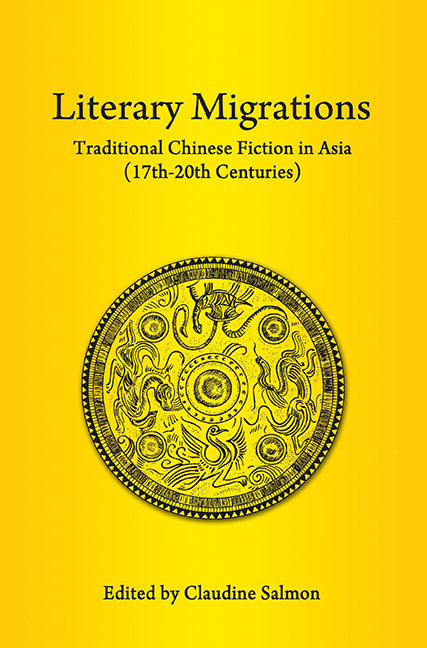Book contents
- Frontmatter
- Contents
- FOREWORD
- Dr Salmon as I Know her
- Preface to Reprint Edition
- Acknowledgements
- INTRODUCTION
- PART I KOREA AND JAPAN
- PART II MAINLAND NORTHEAST ASIA
- PART III MAINLAND SOUTHEAST ASIA
- PART IV INSULAR SOUTHEAST ASIA
- 10 A Note on Javanese Works Derived from Chinese Fiction
- 11 Malay Translations of Chinese Fiction in Indonesia
- 12 Writings in Romanized Malay by the Chinese of Malaya — A Preliminary Inquiry
- 13 Lie Sie Bin Yoe Tee Hoe — Six Malay/Indonesian Translations of a Chinese Tale
- 14 Liang Shanbo yu Zhu Yingtai — A Chinese Folk Romance in Java and Bali
- 15 Translations of Chinese Fiction into Makassarese
- 16 Sam Pek Eng Tay — A Chinese Love Story in Madurese
- 17 Post-war Kung Fu Novels in Indonesia — A Preliminary Survey
- Bibliography
- Author, story-teller and translator index
- Title index
- List of Plates
- Contributors
- Plate section
11 - Malay Translations of Chinese Fiction in Indonesia
from PART IV - INSULAR SOUTHEAST ASIA
Published online by Cambridge University Press: 21 October 2015
- Frontmatter
- Contents
- FOREWORD
- Dr Salmon as I Know her
- Preface to Reprint Edition
- Acknowledgements
- INTRODUCTION
- PART I KOREA AND JAPAN
- PART II MAINLAND NORTHEAST ASIA
- PART III MAINLAND SOUTHEAST ASIA
- PART IV INSULAR SOUTHEAST ASIA
- 10 A Note on Javanese Works Derived from Chinese Fiction
- 11 Malay Translations of Chinese Fiction in Indonesia
- 12 Writings in Romanized Malay by the Chinese of Malaya — A Preliminary Inquiry
- 13 Lie Sie Bin Yoe Tee Hoe — Six Malay/Indonesian Translations of a Chinese Tale
- 14 Liang Shanbo yu Zhu Yingtai — A Chinese Folk Romance in Java and Bali
- 15 Translations of Chinese Fiction into Makassarese
- 16 Sam Pek Eng Tay — A Chinese Love Story in Madurese
- 17 Post-war Kung Fu Novels in Indonesia — A Preliminary Survey
- Bibliography
- Author, story-teller and translator index
- Title index
- List of Plates
- Contributors
- Plate section
Summary
In a previous study on the literature in Malay by the Chinese of Indonesia we listed no less than 759 translations from the Chinese (not counting reprints)which spanned nearly a century (from the 1870s until the 1960s). For the same period we counted only some 233 Chinese-Malay translations of Western works. The comparison of these two figures proves that the Chinese of Indonesia had in the long run, a deeper interest in the culture of their motherland. If we exclude didactic and religious works, the great majority of these translations consisted of novels and short stories. Since most of these were translated and published in Java where until the 1920s Sundanese and more especially Javanese were still largely used as written and spoken languages, we are confronted here with the question of the spread of Malay language among the urban population of that island, and especially among the Chinese.
In spite of the fact that Chinese communities may be traced in Java and Sumatra at least since the beginning of the fifteenth century very little is known of their cultural life. In the seventeenth century, the Dong xi yang kao mentions Chinese who acted as secretaries and interpreters for the Sultan of Banten (West Java), which suggests that some of them, at least, learned the local language, very likely Javanese, fairly quickly. Another text dating from the end of the eighteenth century says that in Java a group of descendants of Chinese existed who had been converted to Islam and the Javanese way of life and were thoroughly acquainted with the local language:
When the Chinese remain abroad for several generations, without returning to their native land, they frequently cut themselves off from the instructions of the sages; in language, food and dress they imitate the natives and studying foreign books, they do not scruple to become Javanese, when they call themselves Selam (Sit-lam). They then refuse to eat pork and adopt altogether native customs. Having multiplied, in course of time, the Dutch have given them into the hands of a Captain, who superintends this class.
- Type
- Chapter
- Information
- Literary MigrationsTraditional Chinese Fiction in Asia (17th–20th Centuries), pp. 248 - 276Publisher: ISEAS–Yusof Ishak InstitutePrint publication year: 2013

